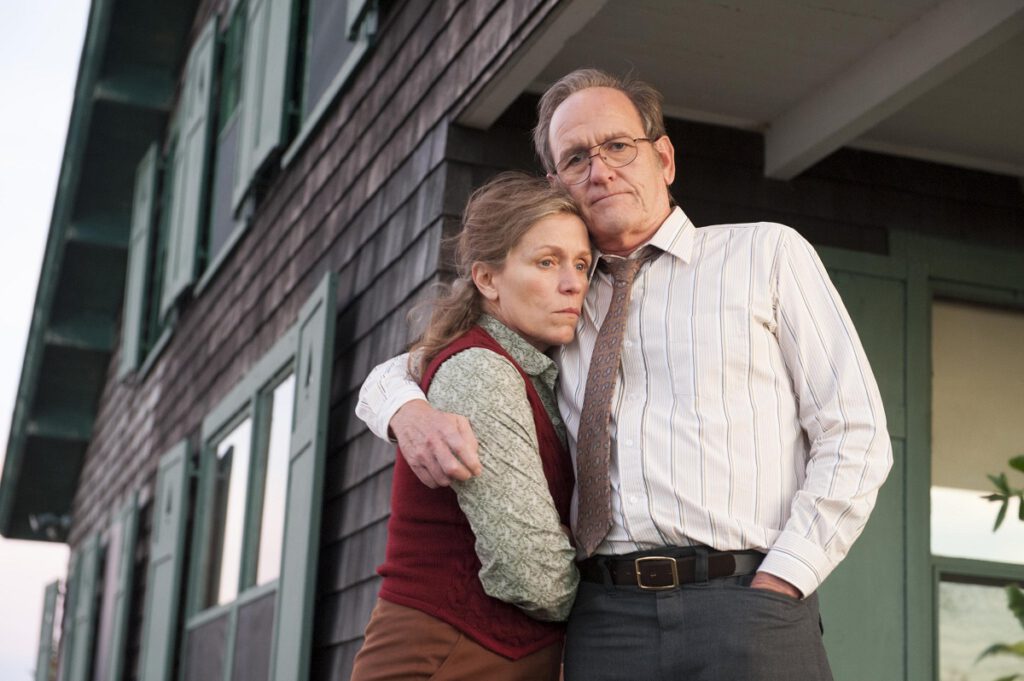Few films have tapped into the seemingly conflicting
emotions that exist in the human soul at exactly the same moment as HBO’s
stellar “Olive Kitteridge,” a delicate, beautiful mini-series starring Frances
McDormand, Richard Jenkins, Rosemarie DeWitt, Peter Mullan, Bill Murray and
more. Cinematic fiction is so often about characters with simply defined
emotions. This protagonist is happy. This villain is vengeful. This hero is in
love. It’s much harder, and takes actors of the caliber assembled for this
production, to sketch characters who both love and hate at the same time; who
feel regretful and content simultaneously; who wouldn’t change a thing but can’t
shake their depression. Stretched out over 4 hours on two nights, with each
hour playing like a distinct chapter in a book, “Olive Kitteridge” provides the
richness of character and setting that is more common in narrative fiction than
cinema.

The episodic, nearly Raymond Carver-esque feel of “Olive
Kitteridge” is due to the fact that writer Jane Anderson has adapted the
mini-series from a collection of short stories by Elizabeth Strout, which won
the Pulitzer Prize. The stories span 25 years, and six of them have been
adapted into four episodes here. Each episode feels focused in its own
narrative, with different characters taking center stage but all of the
narrative threads play into the unpredictability of life and the complexity of
human emotion. As the HBO tagline says, “There’s no such thing as a simple
life.”
Take the second episode, easily the best of the four and one of the best hours of TV this year, which spends a lot of time on two
elements—the return of a suicidal young man to town, coinciding with the
wedding of Chris Kitteridge (John Gallagher). Olive is faced with stark
reminders of the past and future in a former friend of her son in whom she can
see the open wounds of his mother’s depression, and that ultimate emotional
whirlpool that is a child’s wedding. There are unexpected life interruptions in
“Olive Kitteridge” that don’t feel manipulative. When a character dies
unexpectedly or saves a life unexpectedly, it fits into the narrative fabric of
the overall piece. And reflects something about reality rarely captured. A
life-saver may have been planning to kill himself mere moments before. The start
of a happy life can be suddenly ended by a tragedy. Kids get married, kids get
divorced. We can’t predict the future and we can’t live in the past. We may
think someone is perfect for someone else, only to watch them grow up into a
manipulative asshole. We may think someone is the wrong fit, but not be able to
say so.

Of course, all of this rich subtext wouldn’t work without
the kind of complex performers that Lisa Cholodenko (“The Kids Are All Right”)
expertly assembled for this project. It’s undeniable that Kitteridge, with her
blend of world-weariness and cynicism, fits like a glove for Frances McDormand,
but that doesn’t make what she does here any less remarkable. The opening scene
of the second episode, in which Olive is basically intervening in a suicide and
knows it but can’t say it, is a master class in acting. It’s one of the best
scenes of the year in all of television. Richard Jenkins is a perfect acting
partner for her, offsetting Olive’s pessimism with a wide-eyed will to see the
good in everyone. In the first episode, Jenkins’ Henry hires a new employee
(Zoe Kazan) at his pharmacy, and develops a clear attraction for the naïve girl
who is the opposite of his bitter wife. The way Jenkins plays Henry’s longing
for a bit more joy while still maintaining the character of a man who seems
unlikely to do anything about his new feelings contains real depth. Bill Murray
doesn’t show up until night two, as a widower who draws closer to Olive. Even
small roles, like those filled out by DeWitt, Ann Dowd, John Gallagher and
more, are expertly cast and directed.
“Olive Kitteridge” won’t be for everyone. There
are long scenes of repetitive dialogue that too often reinforces the happy-sad
duality in the Kitteridge marriage, and the piece could arguably have been a
bit more visually striking. I also wonder if the mini-series wouldn’t have been
stronger overall with more episodes, and their accompanying time to invest in
supporting characters who sometimes feel like devices more than people. (It was
once considered for a whole season, which I think would have been better—four hours
feels like both too little time to really get to know the whole town and too
much time to get to know just the Kitteridges.) Also, the third episode is
constructed around a major, unexpected event that feels overly scripted. I
liked “Olive” more in its quiet beats than its loud ones, the latter often feel
like narrative constructions designed to reveal the buried secrets, resentments
and feelings just below the surface. As it has to be, “Olive Kitteridge” is
structured to capture the major events of a 25-year span, the moments that will
be remembered on a death bed. But it’s the truthful writing and performances
between those moments that make it memorable, that make it something remarkably close to life.












